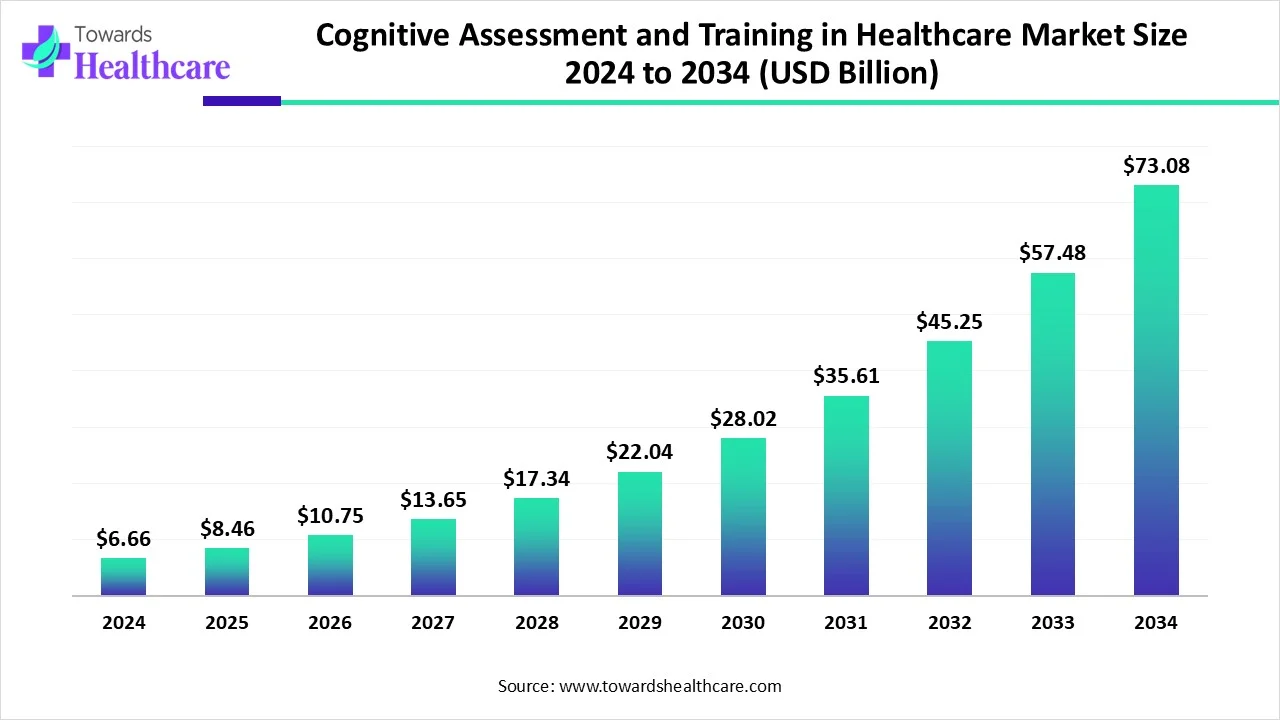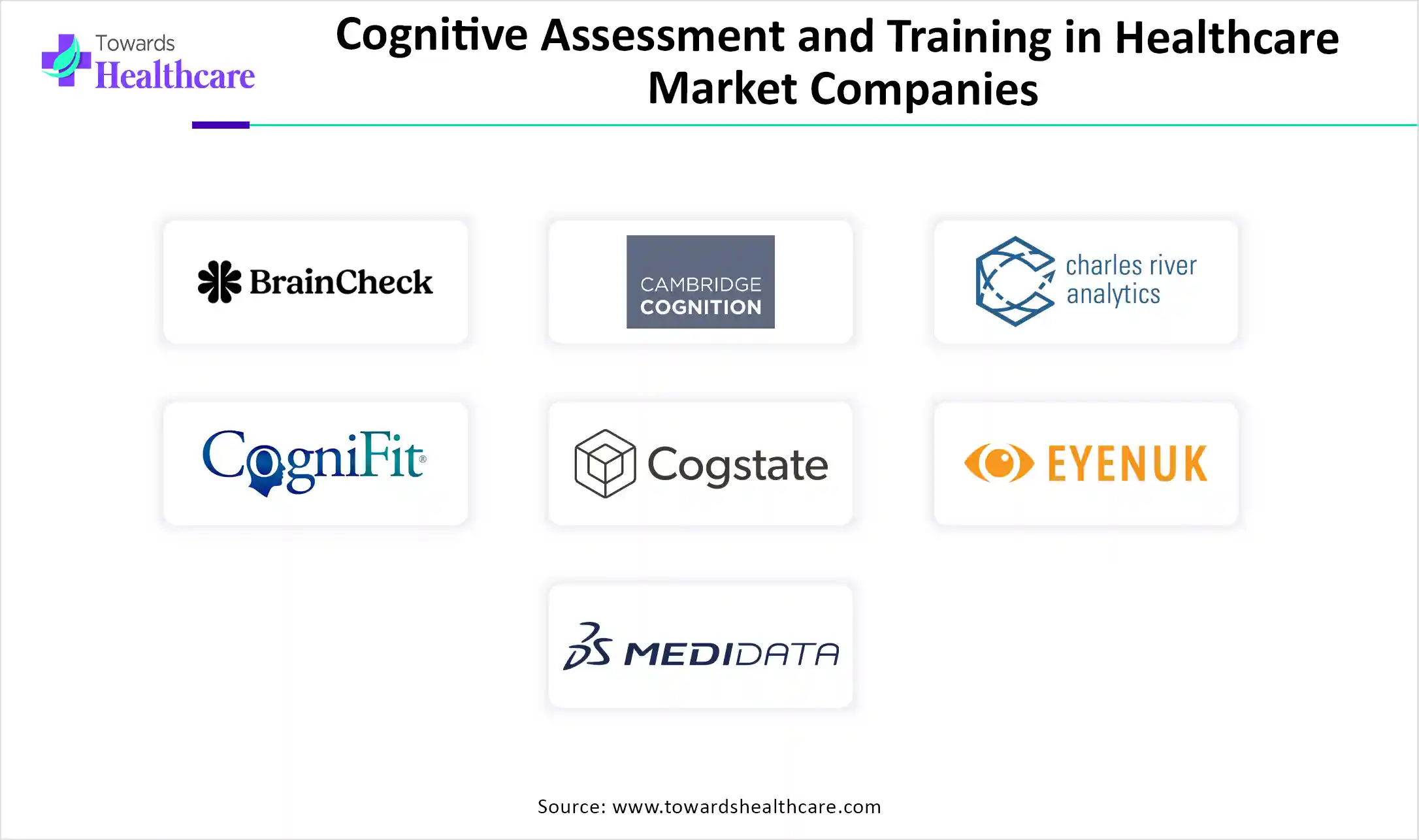February 2026

The global cognitive assessment and training in healthcare market size is calculated at USD 6.66 billion in 2024, grew to USD 8.46 billion in 2025, and is projected to reach around 73.08 billion by 2034. The market is expanding at a CAGR of 27.06% between 2025 and 2034.

| Metric | Details |
| Market Size in 2024 | USD 6.66 Billion |
| Projected Market Size in 2034 | USD 73.08 Billion |
| CAGR (2025 - 2034) | 27.06% |
| Leading Region | North America |
| Market Segmentation | By Assessment, By Component, By Application, By Region |
| Top Key Players |
BrainCheck, Brain Resource Company, Cambridge Cognition Ltd., Charles River Analytics, CogniFit, Inc., Cogstate Ltd., Eyenuk, Inc., Medidata, Pearson, plc, Sway Medical, Inc., Virtuleap, XRHealth |
Cognitive assessment refers to a test to determine cognitive impairment, resulting in a deficiency in knowledge, thought process, or judgment. Cognitive impairment is a result of mental disorders, such as Alzheimer’s disease, Parkinson’s disease, or stroke. Cognitive assessment is performed to identify disabilities related to learning, attention, decision-making, and reasoning. It is not used to detect mental disorders. The commonly used mental status screening tools include the Mini-Mental Status Exam (MMSE) and the Montreal Cognitive Assessment (MoCA).
The rising prevalence of mental health disorders leads to cognitive impairment, necessitating cognitive assessment and training. The growing awareness of psychiatric rehabilitation and the need to improve quality of life boosts the market. Technological advancements lead to the development of innovative products for cognitive assessment and training. Numerous government organizations launch initiatives for the screening and early identification of mental disorders.
Artificial intelligence (AI) and machine learning (ML) algorithms can revolutionize cognitive assessment and training by introducing automation. AI and ML can analyze vast amounts of data and detect the stage of cognitive impairment, enhancing accuracy and precision. Several studies have proved natural language processing (NLP) and computer vision as promising tools for detecting cognitive decline at early stages. AI algorithms adapt based on real-time patient data and update their learning continuously, providing personalized cognitive training. AI and ML can allow a deeper understanding of patients’ cognitive and emotional states, facilitating clinical decision-making.
Rising Prevalence of Neurological Disorders
The rising prevalence of neurological disorders, such as dementia, mild cognitive impairment (MCI), brain stroke, and diabetic neuropathy. The World Health Organization (WHO) stated that 1 in 3 people globally are affected by neurological conditions. These disorders are leading causes of illness and disability globally. The WHO’s “Intersectoral Global Action Plan on Epilepsy and Other Neurological Disorders 2022-2031” sets a roadmap for countries to improve prevention, early identification, treatment, and rehabilitation of neurological disorders. This increases awareness among the general public for timely intervention of their cognitive impairment, promoting cognitive assessment & training.
Lack of Access
The major challenge of the cognitive assessment and training in healthcare market is the lack of access to treatment in developing and underdeveloped countries. More than 80% of neurological deaths and health loss occur in low- and middle-income countries, requiring advanced care.
Extended Reality
The future of cognitive assessment & training is promising, driven by the increasing use of extended reality (XR) technologies. XR technologies include virtual reality (VR), augmented reality (AR), and mixed reality (MR). They offer immersive and interactive environments that simulate real-world tasks, allowing more detailed understanding of cognitive and emotional processes. They are embedded with multimodal feedback systems, such as eye tracking (ET), galvanic skin response (GSR), electroencephalography (EEG), and body tracking. XR technologies can adapt task difficulty in real time based on patient performance and cognitive load, enabling healthcare professionals to provide personalized assessments & training.
By assessment, the pen & paper-based assessment segment held a dominant presence in the cognitive assessment and training in healthcare market in 2024. Pen & paper-based assessment is commonly known as the self-administered gerocognitive exam (SAGE). It is used to detect early signs of cognitive, thinking, or memory impairments, including orientation, visuospatial ability, language, memory, and abstraction. This test can be performed in a healthcare setting as well as at home, prioritizing the geriatric population. It eliminates the need for costly, advanced tools for cognitive assessment.
By assessment, the hosted assessment segment is predicted to witness significant growth in the cognitive assessment and training in healthcare market over the forecast period. A hosted assessment or web-based assessment involves the use of digital tools for remote cognitive assessment. It offers increased accessibility and scalability, and more targeted solutions to measure specific cognitive domains. Advancements in connectivity technology and the Internet of Things (IoT) boost the segment’s growth. These technologies automate test delivery, enhancing sensitivity and reducing human errors.
By component, the services segment held the largest share of the cognitive assessment and training in healthcare market in 2024. Numerous organizations offer comprehensive services related to cognitive training and consultation. Healthcare professionals provide advanced-level expertise by offering personalized care to patients. They help patients to understand individual patterns of learning and thinking, determining ideal settings, services, and approaches. Services are generally more affordable and eliminate the need to purchase expensive tools.
By component, the solutions segment is anticipated to grow with the highest CAGR in the cognitive assessment and training in healthcare market during the studied years. Cognitive assessment solutions refer to various tools for cognitive evaluation. The availability of advanced and innovative tools integrated with advanced technologies augments the segment’s growth. These solutions enable real-time monitoring of patients’ conditions, offering tailored care. They provide timely data access, data management, and analysis, simplifying the task of healthcare professionals and patients.
By application, the clinical trials segment led the global market in 2024. Cognitive assessment and training are essential for subjects participating in clinical trials. Cognitive impairments may significantly affect patients’ quality of life and the clinical drug development process, thereby hampering results. Early detection gives an idea about drug-related cognitive adverse effects, enabling early intervention. The increasing number of clinical trials fosters the segment’s growth. There are more than 20,000 active clinical trials registered on the clinicaltrials.gov website as of April 2025.
By application, the screening & diagnostics segment is anticipated to show lucrative growth in the cognitive assessment and training in healthcare market over the studied years. The rising prevalence of neurological disorders and the need for early diagnosis propel the segment’s growth. Favorable government initiatives also encourage patients to undergo screening and diagnosis of neurological disorders. Apart from neurological disorders, cognitive assessment is also essential for other conditions, like post-surgical care, trauma, or tumors. It is estimated that about 70% of people experience trauma at least once in their lifetime. Out of these, 20% of people will develop post-traumatic stress disorder (PTSD).
North America dominated the global cognitive assessment and training in healthcare market in 2024. The rising adoption of advanced technologies and supportive healthcare infrastructure drives the market. Favorable government initiatives and regulatory bodies promote the detection and treatment of mental health disorders. The increasing investments by government and private organizations support the development of cutting-edge technologies for cognitive assessment and training. The growing need for enhanced patient care and personalized treatments also boosts the market.
The Centers for Disease Control and Prevention (CDC) launched the “HBI State and Local Road Map for Public Health 2023-2027” as part of the Healthy Brain Initiative (HBI). The initiative was launched to help public health professionals take action to improve brain health and support caregivers.
The Canadian Consortium on Neurodegeneration in Aging (CCNA) is a component of the Brain Health and Cognitive Impairment in Aging (BHCIA) Research Initiative launched in March 2023. It supports research involving neurodegenerative diseases in aging that affect cognition. The CCNA receives $5 million in funding annually from the Government of Canada.
Asia-Pacific is projected to host the fastest-growing cognitive assessment and training in healthcare market in the coming years. The market in Asia-Pacific is expanding due to the rising geriatric population and increasing awareness about mental health. The increasing investments, collaborations, and mergers & acquisitions promote the development of innovative cognitive assessment tools. Several government and private institutions organize workshops and seminars to train professionals and create awareness among the general public.
In April 2024, the Union Health Ministry formed a “National Task Force on Brain Health” to improve accessibility and quality of brain healthcare at primary, secondary, and tertiary healthcare levels. It will also recommend specific actions for strengthening and creating a robust, structured system to provide effective and timely diagnosis, treatment, and care to patients with neurological disorders.
Japan’s Ministry of Internal Affairs and Communications reported that around one-third of the Japanese population is over 65 years old, accounting for 36.25 million. Out of these, around 15% of the people, or 5.84 million people, are estimated to have dementia by 2040, as suggested by the health ministry.
Europe is expected to grow at a considerable rate in the cognitive assessment and training in healthcare market in the upcoming period. The rapidly expanding healthcare infrastructure and growing research and development activities augment the market. Favorable government support and increasing investment support the market. According to a recent survey, approximately 46% of Europeans faced emotional and psychosocial problems in 2023. The presence of skilled professionals provides exceptional rehabilitation services to Europeans. The increasing focus on digitized healthcare also contributes to market growth.
The UK government announced an investment of £150 million up to April 2025 to build 150 new facilities to support emergency mental healthcare. The funding will also be used for procuring 100 new ambulances to deliver support. The government also invested around £2.3 billion of additional funding by April 2024 to expand and transform mental health services in England to support 2 million people.

Nicholas Shapiro, Vice President of UPMC Enterprises, commented on investing $15 million in BrainCheck that he invested to enhance a deep understanding of the pressing burden of cognitive impairment on healthcare and the exciting solutions to advance the industry. He said that he wishes to work collaboratively with the team to drive strategic initiatives and shape the future growth trajectory of the company.
By Assessment
By Component
By Application
By Region
February 2026
February 2026
January 2026
January 2026